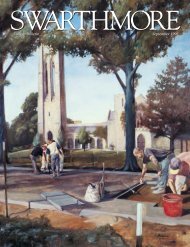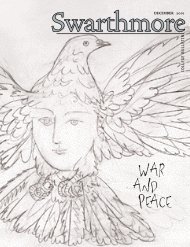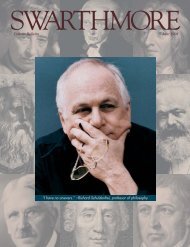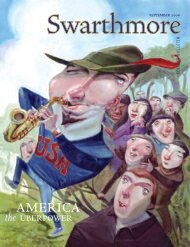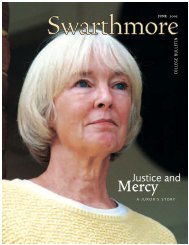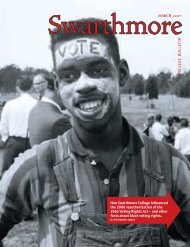A Walk in the Woods
Swarthmore College Bulletin (March 2001) - ITS
Swarthmore College Bulletin (March 2001) - ITS
Create successful ePaper yourself
Turn your PDF publications into a flip-book with our unique Google optimized e-Paper software.
Every aspir<strong>in</strong>g scientist learns that<strong>the</strong> path of discovery is paved withopposition—especially when an assumption,belief, or notion that everyoneth<strong>in</strong>ks of as true is proven false.In our hi-tech world, much of thisopposition rema<strong>in</strong>s comfortably <strong>in</strong> <strong>the</strong>past. No religious leader has forced amodern-day Galileo to recant hisf<strong>in</strong>d<strong>in</strong>gs, and no 20th-century scientistsuffered like <strong>the</strong> monk Giordano Bruno,who, <strong>in</strong> 1600, was burned at <strong>the</strong> stakefor suggest<strong>in</strong>g that <strong>the</strong> universe couldconta<strong>in</strong> an <strong>in</strong>f<strong>in</strong>ite number of stars withplanets whirl<strong>in</strong>g around <strong>the</strong>m.But <strong>the</strong>re rema<strong>in</strong>s with<strong>in</strong> <strong>the</strong> field ofscientific endeavor a risk almost asperilous, whose consequences can havedevastat<strong>in</strong>g results: <strong>the</strong> possibility that,after years of search<strong>in</strong>g for—andth<strong>in</strong>k<strong>in</strong>g you have found—<strong>the</strong> truth,a colleague comes to you with resultsthat question your f<strong>in</strong>d<strong>in</strong>gs.It is almost ironic that just such aseries of events occurred almost 40 yearsago at Swarthmore <strong>in</strong> <strong>the</strong> Department ofAstronomy.Barnard’sW bbleW a s i t a p l a n e t ?s a i dP r o b a b l y ,l e g e n d a r yS w a r t h m o r ea s t r o n o m e rP e t e r V a n d e K a m p .L i k e l y n o t ,s a i d h i s c h o s e ns u c c e s s o r ,W u l f f H e i n t z .By Bill KentWhat happened at Swarthmorebetween Peter Van de Kampand Wulff He<strong>in</strong>tz is very significantwith<strong>in</strong> <strong>the</strong> astronomical worldbecause it underscored <strong>the</strong> unpredictableconsequences <strong>in</strong>herent <strong>in</strong> all serious research,”says Paul Halpern, a physics professorat <strong>the</strong> University of <strong>the</strong> Sciences <strong>in</strong>Philadelphia, who wrote about <strong>the</strong> twoSwarthmore astronomers <strong>in</strong> his 1997 bookThe Quest for Alien Planets: Explor<strong>in</strong>g WorldsOutside <strong>the</strong> Solar System. “Stories like thishappen often <strong>in</strong> science, but you don’t hearabout <strong>the</strong>m much because, let’s face it, peoplelike to hear about <strong>the</strong> upside <strong>in</strong> mak<strong>in</strong>gimportant discoveries, not <strong>the</strong> downside.”Indeed, <strong>the</strong> scientific world respondedwith noth<strong>in</strong>g but praise <strong>in</strong> 1963, when Vande Kamp, now deceased but <strong>the</strong>n a professorof astronomy and director of <strong>the</strong>Sproul Observatory, announced that hehad sufficient evidence to suggest that hehad found a planetary system beyond <strong>the</strong>solar system.Though scientists and science fictionwriters had assumed that o<strong>the</strong>r such systemsexisted <strong>in</strong> <strong>the</strong> universe, <strong>the</strong> actual discoveryof one was like f<strong>in</strong>d<strong>in</strong>g astronomy’sHoly Grail. The 1963 announcement madeVan de Kamp, already a beloved figure on<strong>the</strong> Swarthmore campus, one of <strong>the</strong> mostfamous astronomers <strong>in</strong> <strong>the</strong> world.Sarah Lipp<strong>in</strong>cott Zimmerman ’42, professoremerita of astronomy and directoremerita of <strong>the</strong> Sproul Observatory, whowas Van de Kamp’s research associate andlater director of <strong>the</strong> Sproul Observatory,remembers him as “a charm<strong>in</strong>g man, <strong>in</strong>terested<strong>in</strong> a great many th<strong>in</strong>gs outside ofastronomy.”A native of Holland, Van de Kamp cameto Swarthmore <strong>in</strong> 1937 and rapidly establishedhimself as a witty, charismatic personalityand virtuoso pianist. He conducted<strong>the</strong> College orchestra <strong>in</strong> <strong>the</strong> 1950s andhosted “Charlie Chapl<strong>in</strong> Sem<strong>in</strong>ars” <strong>in</strong>Clothier Hall, where he showed films fromhis collection of Chapl<strong>in</strong> silent comedieswhile perform<strong>in</strong>g <strong>the</strong> piano accompaniment.A fan of both classical and Americanpopular music, he composed tunes that henamed after <strong>the</strong> stars he observed. Musicalsatirist Peter Schickele ’57 composed “TheEasy Go<strong>in</strong>’ P.V.D.K. Ever-Lov<strong>in</strong>’ Rag” forVan de Kamp’s 70th birthday. Dur<strong>in</strong>g hisM A R C H 2 0 0 129



